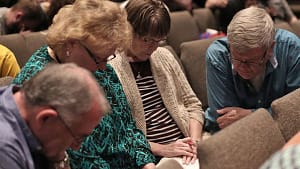By Nigel Christensen
Recently we had the passing of Queen Elizabeth II, followed by all the official proceedings involved with King Charles III’s ascension to the throne. Psalm 47 gives us a prophetic snapshot of the future ascension of Messiah to His throne following His second coming.
Something that is amazing to consider is that, as believers in Yeshua as the Messiah, we will be eyewitnesses to this event.
Make Some Noise!
“Clap your hands, all peoples! Shout to God with loud songs of joy! For the LORD, the Most High, is to be feared, a great king over all the earth. He subdued peoples under us, and nations under our feet. He chose our heritage for us, the pride of Jacob whom he loves. Selah” (Psalm 47:1-4 ESV).
The setting of this Psalm is prophetic and pictures the nations after the tribulation, and leading into the Messianic Kingdom. Keeping in mind that following the national salvation of Israel in the last days of the tribulation (Hosea 6:1-2) and the sheep and goat judgment of the Gentiles (Matthew 25:31-46), only believers will enter the Kingdom. This explains why this instruction is given to all the peoples, because all peoples will be worshippers of the Most High God.
The Psalmist then outlines changes in authority that will occur following Messiah’s second coming. He will put the nations under Israel’s feet, as this is a promised blessing that results from their obedience to Him (Deut 28:13,44). Israel’s position over the nations also stems from the LORD’s love for her. (Deut 10:15). The author places the word Selah (which means to pause and consider this) in a way that draws attention to the fact that the covenantal relationship between God and His chosen people Israel is one based on God’s love.
Prepare to Praise!
“God has gone up with a shout, the LORD with the sound of a trumpet. Sing praises to God, sing praises! Sing praises to our King, sing praises! For God is the King of all the earth; sing praises with a psalm! God reigns over the nations; God sits on his holy throne. (Psalm 47:5-8 ESV).
The Psalmist now switches focus from the people praising, to the one being praised, the LORD. “God has gone up with a shout!” The context of this Psalm shows that this is referring to the fact that he is ascending to His holy throne. The response to this is a shout and the sounding of a trumpet, followed by the singing of praises with a psalm to our King, the God of all the earth. He will now reign over the nations from His holy throne. In the context of the Messianic Kingdom, this will be a fulfilment of the Davidic covenant whereby David was promised an eternal descendant who will rule and reign from the throne of David over Israel and the world.
This was what the angel referred to when he said to Mary, “He will be great and will be called the Son of the Most High. And the Lord God will give to him the throne of his father David, and he will reign over the house of Jacob forever, and of his kingdom there will be no end” (Luke 1:32-33 ESV).
In addition to fulfilling the promises of the Davidic covenant, this will also fulfil prophecies made even earlier in biblical history. For example, in Genesis 49:10 Jacob prophesied, “The sceptre will not depart from Judah or the staff from between his feet until he whose right it is comes and the obedience of the peoples belongs to him” (Genesis 49:10 CSB). Also, in his oracles, Balaam prophesied that Israel’s future Messianic King would rule during a time of great prosperity for Israel and be exalted above every other king (Num 24:5-7). This prophetic oracle climaxes with a vision of the Messianic King to come: “I see him, but not now; I behold him, but not near: a star shall come out of Jacob, and a sceptre shall rise out of Israel; it
shall crush the forehead of Moab and break down all the sons of Sheth” (Num 24:17 ESV). Messiah’s return will result in the complete defeat of the enemies of God and Israel. Jesus connects himself to this prophecy concerning this star of Jacob, the future Messianic King: “I, Jesus, have sent my angel to testify to you about these things for the churches. I am the root and the descendant of David, the bright morning star” (Rev 22:16 ESV).
As impressive as all the pageantry of the British monarchy is, one day we will witness something far more glorious: The ascension of the King of Glory, our LORD, Saviour and Messiah Jesus, the King of Kings and Lord of Lords, who will be highly exalted! I look forward to seeing you there!
Selah.







